'Impossible' to make ends meet, Uber drivers say
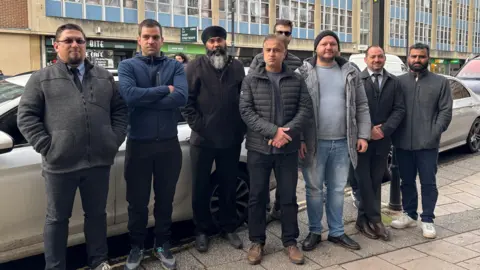 BBC
BBCStanding together in the cold on one of Bristol's busiest streets, driver after driver comes forward to tell us how "impossible" it has become to make a living working for Uber.
Saadane Saker, 48, has more than 20 years experience as a taxi driver in Bristol - six of them with Uber.
"Life is really tough out there, everything has gone up," he said. "To earn what you used to back in the day, you're not going to get it, because the fares are really low.
"What you end up doing instead is working too many hours, most of the drivers out there have got kids and families."
Uber has strongly refuted these claims, saying drivers earn at least a National Living Wage when giving lifts and that they had access to "industry leading worker rights".
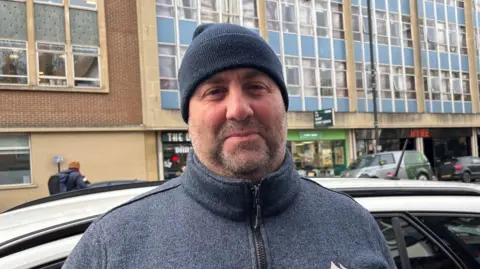
When Uber arrived in the city, it was "brilliant, good money, nice driving, fancy cars - a happy life," said Daniel Pop, who has been an Uber driver since 2016.
But for Mr Pop, and many drivers like him, that wasn't to last. "After the pandemic, when everything started to recover and all the prices went up, Uber prices were the same or even lower than before the pandemic," he said.
"Insurance went up, fuel went up, cost of living went up, and we still have to survive on the same amount of money as before."
It is a story we hear again and again. The promise (for some, in the early days, the reality) of supporting families and fledgling businesses with a flexible income, replaced with a growing anxiety about working hours, opaque commission rates and the ever-present financial pressure.
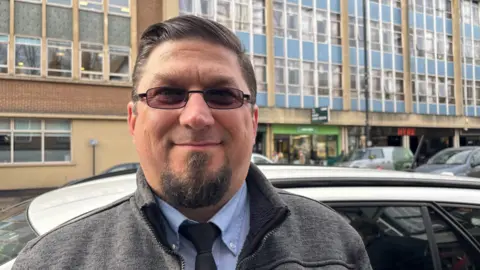
When we put these concerns to Uber a spokesperson said: "All drivers are guaranteed to earn at least the national living wage when taking trips, with Uber topping up earnings if they ever fall below this level, but the vast majority of drivers can and do earn much more."
They added that they "definitely recognise" rising insurance and fuel costs, but said drivers "are earning more since 2021 when we introduced holiday pay, pensions and the national living wage guarantee".
It is important to note that "taking trips" only represents a percentage of a driver's day.
"You could be ten hours online and have five hour's trips, but the other five hours where you didn't do any trips is dead time - zero money, zero earnings," said Mr Pop.
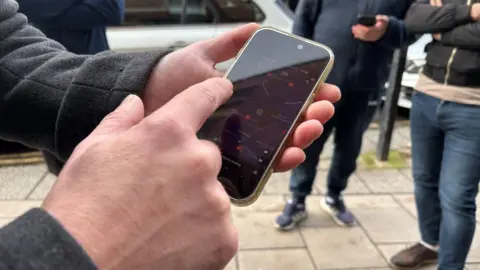
Even after just four years with Uber, Cosmin Caraba, 38, said he has seen a huge change in his experience with the platform.
He told us he started working four days a week, eight to 10 hours a day, but now makes the "same money" working 12 hour days, five days a week.
"It is impossible today to work five days and to be able to pay your car, your insurance, your maintenance and then to take some profit home to pay for things and live a normal life, like normal people," he said. "This is all we're looking for, a normal life," he explained.
An Uber spokesperson said drivers "have access to industry leading worker rights such as a pension and holiday pay, and refuted claims that drivers were working shifts as long as 12 hours, saying for "safety reasons" drivers were not allowed to drive on the app for more than 10 hours in any one go.
'Big lie'
Mr Caraba also described Uber's claim that drivers could work casually for extra money as a "big lie", citing the mounting costs of running a car.
Bristol City Council requires drivers to use a car no more three-and-a-half years old - leaving many drivers with no choice but to buy new vehicles on expensive finance agreements.
A spokesperson said the council's "priority" was to ensure customers travelling in a vehicle licensed by the authority had a "safe and fair journey".
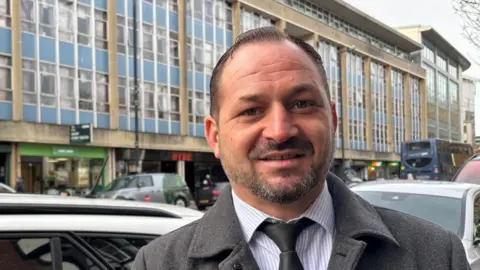
All of the drivers we spoke to said they had seen an increase in the commission Uber takes per ride. Drivers are not shown how much a rider has paid for a journey - only what they earn from it, and are barred from asking a rider how much they have paid.
They are given a weekly percentage figure through the app, showing how much Uber has taken in commission, but there are concerns about transparency when this information isn't provided trip-by-trip.
Mr Saker said when the app first came to the city the maximum commission taken by Uber was 20%, rising to 25% "a year or two later".
But "drivers speak to each other" he said, which had led to them discovering commission rates of up to 41%.
During our interview we ran a short experiment to see this for ourselves, using a phone to hail a short journey in the city centre and watching the request come in to eight drivers' phones.
As riders we were quoted £7.90 for the trip, but the Uber drivers were offered as low as £4.70 for doing the job - a commission rate of around 47%.
Uber drivers do not know what riders pay for each trip, and told us they are barred from asking their customers directly how much they paid.
An Uber spokesperson said commission rates like these were "not the case when averaged out over the week". They added that when Uber became a "merchant operator" in the UK they moved from a fixed "service fee" of 25% to a variable amount.
"It is correct that on some trips the amount kept by Uber can be slightly higher than before, but on other trips it can now be lower than 25% or even 0% in order to increase the chances of matching the trip," they said.
In addition, they said "on average" the amount kept by Uber had "remained stable for many years", but that this did vary "from one driver to another based on they types of trips they took".
'They don't care'
The future is uncertain for many of Bristol's Uber drivers. We heard repeatedly that they could not see themselves remaining in the industry long-term, but were worried about their future job prospects elsewhere.
So where do they go now? Instead of retreating from the platform, many drivers told us they are pushing the worldwide company to change.
Fellow driver Nadeem Butt told us: "Uber should know that Uber is nothing without the drivers. It's just an app - but they don't care."
While driving might seem like a solitary occupation, drivers are in constant communication with each other - becoming increasingly organised.
As we wrap up our interview, Mr Saker has one thing left to say. "We are together. Strength comes with unity."
Follow BBC Bristol on Facebook, X and Instagram. Send your story ideas to us on email or via WhatsApp on 0800 313 4630.
